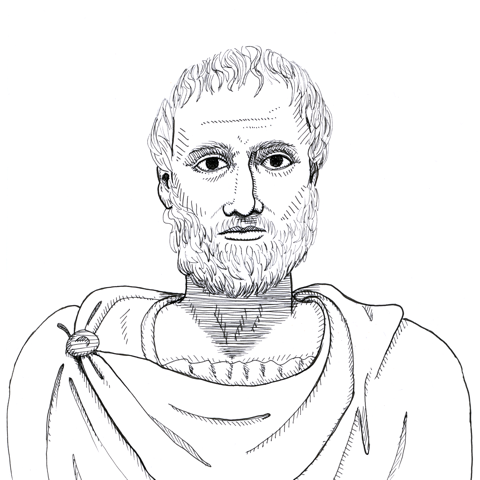Aristotle and Adam Smith
- For more books by Adam Smith
- For more books by Aristotle
- Aristotle and Adam Smith were authors highly regarded by Pierre Goodrich, the founder of Liberty Fund, who included their names on the wall of the Goodrich Seminar Room at Wabash College, Indiana.
Character and Virtue in Aristotle and Adam Smith
The purpose of this colloquium is to explore the conceptions of character and the significance of character for the moral life as understood by two of the most important thinkers in western philosophy, Aristotle and Adam Smith.
While Aristotle and Smith have quite different views on many matters, what they have in common is that each is a remarkable theorist of moral psychology. That is, each had profound insights into the elements of moral character, the relation of the passions and appetites to moral judgment and motivation, and the ways in which character shapes judgment and action. Their accounts of the significance of character development in moral reasoning are of enduring importance and are, increasingly, shaping current debates. Their theorizing is appreciated as among the most valuable resources for our understanding of responsibility for character and its significance in the intersection of moral life and the social and political order. These thinkers and these issues are particularly apt for educators and especially educators working with young people who are not so young that they do not exercise any control over their own actions and states of characters.
Readings
Aristotle’s Nicomachean Ethics
Adam Smith’s Theory of Moral Sentiments
- Part I, Section I and Section II
- Part II, Section I and Section II
- Part III, Chapters I–VI
Session I: Aristotle’s Notion of Human Good.
Why are ethics and politics the studies of the human good? Conferees would examine the notion of an intrinsic end for human beings and the articulation of the main features of human good. How are we to characterize the flourishing or happiness it seems all people seek? What are the main features of an excellent life? What is the ethical significance of happiness and the well-lived life? Readings: Aristotle’s Nicomachean Ethics, Book I.
Session II: The Role of Virtues.
What is the role of virtue in a well-led life and how are virtues acquired? Conferees would consider the significance of habituation by others for the generation of our correct conceptions of acting well. In what sense are we responsible for both our actions and our characters? How are we to reconcile the weight and importance of habituation by others with the voluntariness of action and character? Readings: Nicomachean Ethics, Book II and Book III.
Session III: Intellectual Virtues and Correct Understanding.
What is the role of intellectual virtues and correct understanding in good action? This session would focus on the way in which prudence is an action-guiding virtue of thought. This is crucial to Aristotle’s conception of human nature and what is required for the actualization of human excellence. What virtues and virtuous activities make for the unqualifiedly best life? Readings: Nicomachean Ethics, Book VI and Book X.
Session IV: Passion and Self-Conception in Adam Smith.
This session would examine Adam Smith’s Theory of Moral Sentiments and, in particular, Smith’s account of propriety and how it serves as the basis for the rest of the book. This portion of the book is the groundwork for his account of how we make moral judgments, and the ways in which our passions can be well ordered and ill ordered. How do the passions figure in self-conceptions and how we regard others? What is the role of sensibility in our evaluation of actions? How do the passions figure in the most basic sorts of bonds between people in a social world? Readings: Adam Smith’s Theory of Moral Sentiments, Part I, Section I and Section II.
Session V: The Moral Agent and Moral Judgment.
The focus of this session would be on Smith’s conceptions of justice and beneficence, their centrality to social and moral life, and the moral psychology that underlies them. How does Smith characterize resentment, approval, gratitude, and disapprobation? How are these related to the most fundamental elements of moral life, and what unites and distances people from each other in the moral world? Readings: Theory of Moral Sentiments, Part II, Section I and Section II.
Session VI: Moral Duty and Nature and Authority of Conscience.
This session would extend the discussion of Smith and his conception of moral duty, the nature and authority of conscience, and the relation between duty and other motives of conduct. This will be an opportunity to more deeply explore Smith’s understanding of the form and role of moral sensibility and moral imagination in morally excellent agents. This session would also provide the opportunity to consider Smith alongside Aristotle, not as providing competing conceptions of moral psychology, but as crucial resources for articulating our own thoughts about morality and the formation and significance of character. Readings: Theory of Moral Sentiments, Part III, Chapters I–VI.

